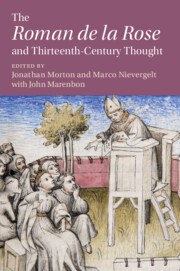Book contents
- The Roman de la Rose and Thirteenth-Century Thought
- Cambridge Studies in Medieval Literature
- The Roman de la Rose and Thirteenth-Century Thought
- Copyright page
- Contents
- Contributors
- Acknowledgements
- Note on Primary Texts
- Introduction
- Part I Epistemology and Language
- Chapter 1 Mechanisms of Belief
- Chapter 2 Visual Experiences and Allegorical Fiction
- Chapter 3 Imposition, Equivocation, and Intention
- Chapter 4 Sophisms and Sophistry in the Roman de la Rose
- Part II Natural Law, Politics, and Society
- Part III Unfinished Business
- Notes
- Bibliography
- Index
- Cambridge Studies in Medieval Literature
Chapter 2 - Visual Experiences and Allegorical Fiction
The Lexis and Paradigm of Fantasie in Jean de Meun’s Rose
from Part I - Epistemology and Language
Published online by Cambridge University Press: 17 June 2020
- The Roman de la Rose and Thirteenth-Century Thought
- Cambridge Studies in Medieval Literature
- The Roman de la Rose and Thirteenth-Century Thought
- Copyright page
- Contents
- Contributors
- Acknowledgements
- Note on Primary Texts
- Introduction
- Part I Epistemology and Language
- Chapter 1 Mechanisms of Belief
- Chapter 2 Visual Experiences and Allegorical Fiction
- Chapter 3 Imposition, Equivocation, and Intention
- Chapter 4 Sophisms and Sophistry in the Roman de la Rose
- Part II Natural Law, Politics, and Society
- Part III Unfinished Business
- Notes
- Bibliography
- Index
- Cambridge Studies in Medieval Literature
Summary
Jean de Meun introduces learned words into French or participates in their diffusion. One of these neologisms is worthy of attention: fantasie, which twice occurs in the romance in significant ways as well as two occurrences of sen commun. Inasmuch as it is an imaginative faculty, fantasie points to the influence of Aristotle’s De anima and commentaries on it by Aquinas and Avicenna, among other works in the same tradition. This mediating faculty between perception and knowledge, between body and soul, leads to a physio-psychology that produces both epistemological reflection and a conception of poetic language and literary theory. I will attempt to read the visual experiences evoked by Jean de Meun through a lexical approach to assess the role of fantasie in relation to knowledge, erotic experience, and allegorical fiction: if Jean de Meun seems to align fantasie with the errors of the senses and of pathology, he simultaneously puts faith in human cognitive faculties, describing human knowledge more broadly in terms of the cognitive processes of vision and optics. The writer thus emerges as a producer of images, while the reader is called upon to evaluate and interpret this visual language.
- Type
- Chapter
- Information
- The ‘Roman de la Rose' and Thirteenth-Century Thought , pp. 45 - 64Publisher: Cambridge University PressPrint publication year: 2020

